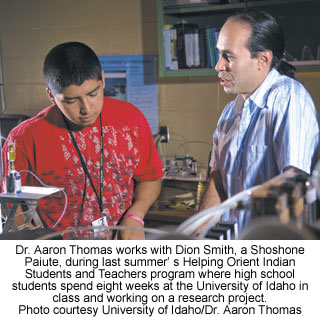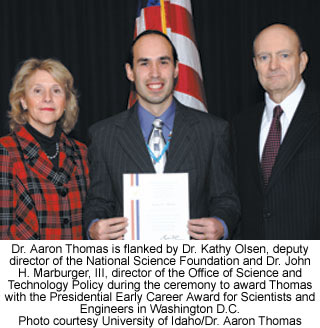 |
Canku Ota
|
 |
|
(Many Paths)
|
||
|
An Online Newsletter
Celebrating Native America
|
||
|
April 1, 2009 - Volume
7 Number 4
|
||
|
|
||
|
Idaho Professor Awarded
At White House
|
||
|
by Jack McNeel - Indian
Country Today correspondent
|
||
|
Thomas said he received help from many people throughout his career. “I feel it is my responsibility to do the same for other students, specifically Native students in the community. I believe my background and my position provide unique opportunities to positively impact the Native community. The best I can, I help them get their degrees in science and engineering. In partnership with a lot of Native staff and faculty on campus, we’re trying to not only bring Native students to the university, but keep them here and help them achieve their undergraduate degree. “My outreach goals are to increase the number of students in science and engineering, specifically Native American/Alaska Native students.” These outreach programs include visits to area schools where he gives a series of demonstration experiments hoping to spur interest in science or engineering. “One demonstration is making ice cream out of liquid nitrogen. It doesn’t say much about science and engineering, but it looks really cool and hopefully is something they’ll remember.” His latest involvement was with a computer building class in conjunction with the University of Alaska. The Alaska Native Science and Engineering Program in Idaho was pioneered in Alaska and has spread to schools in South Dakota, Hawaii, Washington, Montana and Idaho. It’s part of an “indigenous alliance of schools,” he explained, to implement the same program in the respective states. Thomas and Ed Galindo, Yaqui, director of the Natural Resources Tribal Cooperative at the University of Idaho, are co-leaders in this program. It works by visits to schools where high school students are assisted in individually building computers. “They have to put everything together: mother boards, memory cards, computer chips,” Thomas explained. “The students get to keep the computers, but first they have to complete a class in chemistry, physics and trigonometry before they graduate. It’s an incentive for them to complete these classes, but also prepares them better once they move on to college in the fields of science and engineering.” The
program has been successful with Alaska Natives and hopefully it
will be just as successful here. The first class in Idaho was held
last fall at Lapwai High School on the Nez Perce reservation; 10
students participated. The next class is planned for the Coeur d’Alene
Reservation later this spring.
He is also involved with a summer program for Native high school students through the Helping Orient Indian Students and Teachers, or HOIST, program in the fields of science, technology, engineering and math. The program is headed by Steve Martin, who is in charge of the Native Center, and Thomas is one of the professors who works with students on projects. Students spend eight weeks on campus, taking classes in the morning and working on a research project in the afternoon. Students don’t receive college credit although they are paid, and they also learn more about college life and research. Thomas’ research was considered when he was chosen to receive the Presidential Early Career Award, in addition to his work with students. That research is difficult to summarize. One aspect involves separating contaminant gases by using a mechanical separation mechanism. “On long manned space missions the carbon dioxide that humans breathe out must be removed from the air and recycled. People usually do it with membranes that have to be regenerated or replaced. We’re trying to come up with a way to mechanically remove the contaminants using flow oscillations,” he explained. On a small scale he’s looking at separating and detecting such things as DNA or proteins in efficient ways. “Say you’re in a remote area and taking a blood test. Usually that’s sent to a lab and results may take two or three weeks to be returned. We’re trying to get the results in a little hand-held device right away. We’re trying to do everything you can do in a laboratory on the size of a microchip that can be done remotely.” This combination of research and outreach programs earned Thomas a trip to the White House to receive this prestigious award. Dr.
Aaron Thomas is flanked by Dr. Kathy Olsen, deputy director of the
National Science Foundation and Dr. John H. Marburger, III, director
of the Office of Science and Technology Policy during the ceremony
to award Thomas with the Presidential Early Career Award for Scientists
and Engineers in Washington D.C.
Dr.
Aaron Thomas works with Dion Smith, a Shoshone Paiute, during last
summer’s Helping Orient Indian Students and Teachers program
where high school students spend eight weeks at the University of
Idaho in class and working on a research project. |
|
insert map here
|
www.expedia.com |
|
|
||
|
|
||
| Canku Ota is a free Newsletter celebrating Native America, its traditions and accomplishments . We do not provide subscriber or visitor names to anyone. Some articles presented in Canku Ota may contain copyright material. We have received appropriate permissions for republishing any articles. Material appearing here is distributed without profit or monetary gain to those who have expressed an interest. This is in accordance with Title 17 U.S.C. Section 107. | ||
|
Canku Ota is a copyright ©
2000, 2001, 2002, 2003, 2004, 2005, 2006, 2007, 2008, 2009 of Vicki
Barry and Paul Barry.
|
||
 |
 |
|
|
The "Canku
Ota - A Newsletter Celebrating Native America" web site and
its design is the
|
||
|
Copyright ©
1999, 2000, 2001, 2002, 2003, 2004, 2005,
2006, 2007, 2008 of Paul C.
Barry.
|
||
|
All Rights Reserved.
|
||
 MOSCOW,
Idaho – Dr. Aaron Thomas, Navajo, is an associate professor
in the Chemical Engineering Department at the University of Idaho.
His research and work with Native students earned him a recent trip
to the White House in Washington, D.C. to receive the Presidential
Early Career Award for Scientists and Engineers. The award is based
on innovative research and community service.
MOSCOW,
Idaho – Dr. Aaron Thomas, Navajo, is an associate professor
in the Chemical Engineering Department at the University of Idaho.
His research and work with Native students earned him a recent trip
to the White House in Washington, D.C. to receive the Presidential
Early Career Award for Scientists and Engineers. The award is based
on innovative research and community service. Thomas
also tutors students at the university. “If they’re struggling
in math they’re usually sent to me to help them get through
these classes. I’m happy to do that.” He also gives talks
and guides tours when visitors from the different tribes visit the
university, all aimed at making the school inviting to Native students
and encouraging enrollment.
Thomas
also tutors students at the university. “If they’re struggling
in math they’re usually sent to me to help them get through
these classes. I’m happy to do that.” He also gives talks
and guides tours when visitors from the different tribes visit the
university, all aimed at making the school inviting to Native students
and encouraging enrollment.